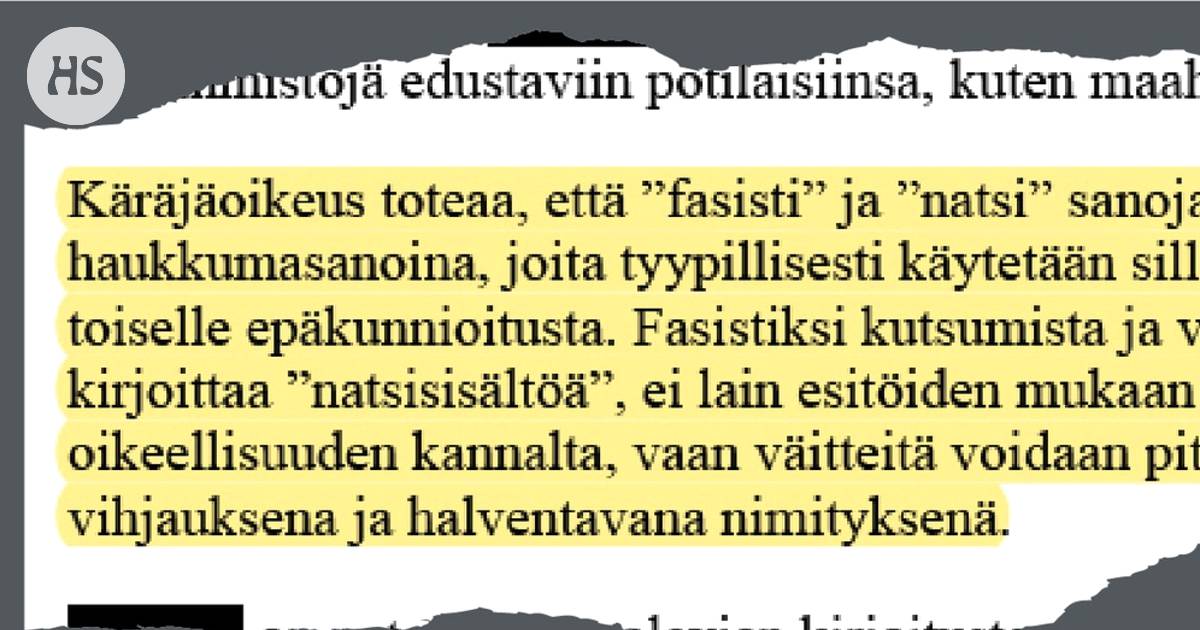The district court has interpreted the stigmatization of the word “fascist” more strictly than in the EIT, whose decision practice binds Finland. However, there have only been a handful of cases before the courts.
In the courts in the last ten years, only a handful of defamation charges have been dealt with, which involved being called a fascist. Helsingin Sanomat's investigation found four such decisions.
It is a bit more common to call another person a Nazi. The term is not only used in political contexts, but a neighbor who smokes, the police and parking attendants have been called Nazis, for example.
The jurisprudence regarding the word “fascist” is current for the speaker of the parliament and the presidential candidate Jussi Halla-ahon (ps) due to criminal reports.
The police is finishing the investigation in which the comedian Iikka Kivea and a Green deputy councilor from Helsinki Only from Tuomi are suspected of defaming Halla-aho when they called Halla-aho a fascist in the message service X.
Helsinki Sanomat received from the Legal Registry Center a list of court decisions in which the words “fascist”, “Nazi” or “communist” appeared in their justifications. The information concerns judgments handed down after January 12, 2014.
There were forty decisions. Not all of them were about the accused having used these designations. Some of the judgments were included only because the justifications cite what was written by leading experts in criminal law Major offenset work.
The book states that disparaging another person can be defamation:
Here comes the question of showing disrespect to another person by using various swear words that are common in the language (such as pig, whore, fascist, pedophile, etc.).
The sentence was copied into every other sentence. In the acts condemned themselves, it could therefore be an example of prostitution or other kinds of barking, not the use of fascist or Nazi words.
The book inspired by some judgments, the starting point is that the name Nazi or fascist is always a bad word, regardless of the context.
This is what the district court of Pirkanmaa concluded, for example, in its decision, where a left-wing local politician was accused of defamation when he had called the chief physician a fascist. The politician had also criticized the doctor for spreading Nazi content on social media and doubted whether he could be fair when treating minority patients.
The chief medical officer's social media accounts are full of extreme right-wing rhetoric, the politician justified his writings in the courts.
The chief physician admitted that he had strongly criticized Islam on social media. His writings included, among other things, links to news reports about crimes committed by immigrants, as well as commenting on the events, often in an ironic tone.
The district court did not assess whether the politician had grounds for appointing the doctor.
Being called a fascist and claiming that [ylilääkäri] write 'Nazi content', according to the provisions of the law, it is not necessary to assess the validity of the statements, but the statements can be considered directly as offensive insinuations and derogatory namesthe district court stated.
The politician was fined 40 days for defamation. The verdict was not appealed to the Court of Appeal.
European based on the ruling practice of the Human Rights Court (EIT), the district court's conclusion is too straightforward.
The EIT has considered that being called a fascist, a Nazi or, for example, an idiot is not a statement of fact, but a value judgment, i.e. an opinion. Thus, it cannot be proven either right or wrong. Because of this, for example, a right-wing populist politician could be called a closet Nazi.
Presenting a value judgment may be defamatory if there is no basis for it.
The most visible the matter related to the Nazi designation was a case that went all the way to the Supreme Court (KKO), in which a journalist Johanna Vehkoo was indicted by a local politician from Oulu Junes Lokan defamation. Vehkoo had called Lokka a racist, a Nazi and a Nazi clown.
The Oulu District Court and the Rovaniemi Court of Appeal sentenced Vehko to fines.
The district court referred in its decision Major crimes -work, but not at all to EIT's solution practice.
The Court of Appeal, on the other hand, reviewed the decisions of the EIT. In its opinion, however, they did not apply to the case, because Vehkoo's Facebook post did not deal with politics or any other question of public interest to which Lokka could have given his answer.
The Supreme Court extensively reviewed the EIT's decisions and overturned Vehkoo's verdict. KKO considered the expressions derogatory, but emphasized that they must be viewed in the context in which they were presented.
Lokka himself had expressed provocative and hateful views about certain groups of people, and therefore he too had to endure criticism, KKO stated. Vehkoo's assessments concerned Loka's conduct in politics and did not exceed what can be considered acceptable.
In October 2023 The Helsinki District Court fined a man who had made four YouTube videos of a woman who worked in minor parties. The man called the woman, among other things, a Nazi, a fascist, a homophobe and a Nazi sympathizer. A man evaluates a woman in many different ways.
The woman had been a candidate in several elections. In her election machine answers, the woman announced that she was promoting the interests of Finns and that she supported broad freedom of speech.
I act as an advocate for freedom of speech. Hate speech is easily used as a way to silence a conversation where someone expresses a wrong opinionthe woman wrote in Yle's election machine in the 2019 parliamentary elections.
In its verdict, the district court took into account the woman's political activities and active participation in the social debate. Nevertheless, the court found it “clear that the quality and frequency of the videos has clearly exceeded the limit of acceptable criticism”.
The man was fined 80 days. The verdict is final.
Short a year ago, the district court of Central Finland fined a woman who had scolded a man active in local politics on Twitter. He had called the man, among other things, a “stupid idiot” and a “racist scumbag”.
In the tweet, the subject tags were, among others, BaskapersePersuTroll, Fascism and Nazis.
The woman said that she considered basic Finns to be racist and wanted to criticize them as a group.
The court referred, among other things, to the KKO's preliminary decision regarding Vehkoo. Now the court ended up condemning the woman, because she did not give any explanation for her naming.
However, the parts of the indictment that referred to Basic Finns as a party and general references to racism, fascism and Nazism were rejected.
The woman was fined 20 days. The verdict is final.
Pirkanmaan there was a case in the district court's proceedings, which was about an immigration discussion held over coffee shops.
According to the other side of the conversation, the local vicar had called him a Nazi and a fascist.
The priest denied this and said that he opposed Finnish national racism. He recalled saying that it has the same kind of argumentation as With Idi Amin, With Hitler and Stalin. In that case, the interlocutor had asked if the vicar called him a fascist and a Nazi.
The priest said he answered: “Your argument is that. I don't know what you are.”
According to the district court, it was no longer possible to find out what exactly had been said. The criminal report was made five months after the incident, and when we got to the courtroom, a year had already passed since the events.
The defamation charge was dismissed.
#Freedom #speech #judgments #barking #fascist #difference #line #emerges

/https://content.production.cdn.art19.com/images/6e/20/75/47/6e207547-4ad6-4811-b8f0-3c7b7a3edb51/0b845a2013df296da2e006375909e160f8cc4c964755dc820563b9006df775)







